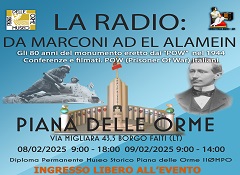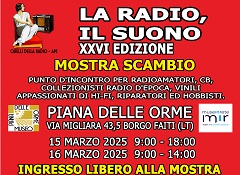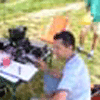ARISS school contatto con l'Italia 14 Ottobre 2019 con Luca
ARISS school contact planned for Settimo Torinese and Monza, Italy International Space Station school contact has been planned for Luca Parmitano KF5KDP with participants at S.M. Calvino – Istituto Comprensivo Settimo IV, Settimo Torinese, Italy and Istituto Comprensivo Statale Don Milani, Monza, Italy.
The event is planned Monday October 14, 2019. It is scheduled to begin at approximately 09.37 UTC, which is 11.37 CEST.
The contact will be conducted in Italian.
The contact will operated by IK1SLD and IQ2MZ. The downlink signals will be audible in parts of Europe on 145.800 MHz FM.
As usually, operations ar IK1SLD ground station will be web streamed on:
https://www.ariotti.com/
This ARISS Europe News Bulletin is distributed to 2700 subscribers
School Information:
S.M. Calvino – Istituto Comprensivo Settimo IV
The comprehensive institute Settimo IV consists of a kindergarten, two primary schools and a secondary school. It is one of the four scholastic poles of Settimo Torinese, a small town just outside Turin, which is a metropolitan city in northern Italy. The city of Settimo in the past years was just a suburban city of Turin that simply hosted the working class families of the big city but it has in recent years aspired to become an exceptional cultural center. Thanks also to the activities of the new multimedia library, designed to be an innovative cultural and informative center, a qualified reference point for information, research and documentation in the scientific area, as well as a center at the forefront of experimentation and use of new technologies.
The Calvino secondary school is the secondary school of I.C. Settimo IV and welcomes about 200 pupils aged between 11 and 14 years mainly from the area adjacent to the new library with which it actively collaborates with cultural and scientific projects.
Istituto Comprensivo Statale Don Milani
The Don Milani Educational Institute has 3 Elementary Schools (pupils aged 5-10) and 1 Middle School (pupils aged 10-14). The Educational Institute has a student population of 1075 pupils divided in different school complex.
In the Triante district are located two Elementary Schools: Tacoli (208 pupils) and Don Milani (241 students), as well as Da Vinci Middle School (253 students), while the San Carlo district hosts Dante’s Elementary School (170 students).
The students attending Don Milani Educational Institute belong to different socio-economic backgrounds, globally the level is medium-high with pupils coming from university-educated parents, with the exception of the school complex Dante’s that covers a lower socio-economicneighbourhood. This area is influenced by immigration from within and outside the EU.
Students First Names & Questions:
S.M. Calvino – Istituto Comprensivo Settimo IV & Istituto Comprensivo Statale Don Milani
1. Quando hai deciso di essere un astronauta?
2. Qual è stata la cosa più bella che hai fatto nello spazio?
3. Perché hai deciso di andare nello spazio?
4. Qual è la prima cosa che hai fatto quando sei arrivato sulla ISS?
5. Da quanto tempo sei là?
6. Nella ISS si capisce dov’è il basso e dov’è l’alto?
7. Per quanto tempo resterete nello spazio?
8. È facile ambientarsi nella stazione spaziale?
9. Quanto tempo ci vuole per arrivare sulla stazione spaziale?
10. Il cielo visto dalla ISS è nero?
11. Come dormi nella navicella?
12. Cosa ti sei portato a bordo della ISS?
13. Cosa fate nel vostro tempo libero?
14. Avete mai provato a giocare a calcio sulla ISS?
15. Come ci si sente a guardare la Terra dalla navetta spaziale?
16. Riuscite a vedere le stelle e a riconoscere le costellazioni?
17. Com'è l’impatto dall’atmosfera terrestre allo spazio?
18. A quale velocità viaggiate e quante albe e tramonti vedete in 24 ore?
19. È pesante la vostra tuta spaziale?
20. Fa freddo lassù? Fa freddo nello spazio?
21. Qual è stato l'astronauta più giovane ad andare sullo spazio?
22. Quando potrò partire anche io per la stazione spaziale?
23. Cosa si prova a stare nello spazio?
24. Cosa si prova a toccare il suolo terrestre dopo essere stati nello spazio?
25. Si può vivere sulla Luna?
26. Cosa vorresti fare nel futuro?
27. Cosa mangi sull’ISS?
28. Che cosa vorresti cambiare della stazione spaziale?
29. Cosa bevi sull’ISS?
30. Come vi arriva il cibo?
About ARISS:
Amateur Radio on the International Space Station (ARISS) is a cooperative venture of international amateur radio societies and the space agencies that support the International Space Station: NASA, Russian Space Agency, ESA, JAXA, and CSA. The US Center for the Advancement of Science in Space (CASIS) and the National Aeronautics and Space Administration (NASA) provide ARISS special support.
ARISS offers an opportunity for students to experience the excitement of Amateur Radio by talking directly with crewmembers on board the International Space Station. Teachers, parents and communities see, first hand, how Amateur Radio and crewmembers on ISS can energize youngsters' interest in science, technology, and learning.
The primary goal of ARISS is to promote exploration of science, technology, engineering, and mathematics (STEM) topics by organizing scheduled contacts via amateur radio between crew members aboard the ISS and students in classrooms or informal education venues. With the help of experienced amateur radio volunteers, ISS crews speak directly with large audiences in a variety of public forums. Before and during these radio contacts, students, teachers, parents, and communities learn about space, space technologies, and amateur radio. For more information, see http://www.ariss.org, http://www.ariss-eu.org and https://www.amsat-on.be/hamtv-summary/.
73,
Gaston Bertels – ON4WF
Si prega di inviare il rapporto QSL per posta all'indirizzo dell'ufficio elencato di seguito per la propria regione. Includi nel rapporto QSL: data, ora in UTC, frequenza e modalità (voce, pacchetto o sstv). Se si desidera ricevere una carta, è necessario includere una busta affrancata e timbrata con affrancatura adeguata o con sufficienti coupon di risposta internazionale (almeno 2 IRC), è necessario richiedere le schede QSL per posta.
F1MOJ ARISS Europa Responsabile QSL 19 Chemin des Escoumeilles 66820 Vernet les Bains Francia .
https://www.ariss.org/qsl-cards.html
The event is planned Monday October 14, 2019. It is scheduled to begin at approximately 09.37 UTC, which is 11.37 CEST.
The contact will be conducted in Italian.
The contact will operated by IK1SLD and IQ2MZ. The downlink signals will be audible in parts of Europe on 145.800 MHz FM.
As usually, operations ar IK1SLD ground station will be web streamed on:
https://www.ariotti.com/
This ARISS Europe News Bulletin is distributed to 2700 subscribers
School Information:
S.M. Calvino – Istituto Comprensivo Settimo IV
The comprehensive institute Settimo IV consists of a kindergarten, two primary schools and a secondary school. It is one of the four scholastic poles of Settimo Torinese, a small town just outside Turin, which is a metropolitan city in northern Italy. The city of Settimo in the past years was just a suburban city of Turin that simply hosted the working class families of the big city but it has in recent years aspired to become an exceptional cultural center. Thanks also to the activities of the new multimedia library, designed to be an innovative cultural and informative center, a qualified reference point for information, research and documentation in the scientific area, as well as a center at the forefront of experimentation and use of new technologies.
The Calvino secondary school is the secondary school of I.C. Settimo IV and welcomes about 200 pupils aged between 11 and 14 years mainly from the area adjacent to the new library with which it actively collaborates with cultural and scientific projects.
Istituto Comprensivo Statale Don Milani
The Don Milani Educational Institute has 3 Elementary Schools (pupils aged 5-10) and 1 Middle School (pupils aged 10-14). The Educational Institute has a student population of 1075 pupils divided in different school complex.
In the Triante district are located two Elementary Schools: Tacoli (208 pupils) and Don Milani (241 students), as well as Da Vinci Middle School (253 students), while the San Carlo district hosts Dante’s Elementary School (170 students).
The students attending Don Milani Educational Institute belong to different socio-economic backgrounds, globally the level is medium-high with pupils coming from university-educated parents, with the exception of the school complex Dante’s that covers a lower socio-economicneighbourhood. This area is influenced by immigration from within and outside the EU.
Students First Names & Questions:
S.M. Calvino – Istituto Comprensivo Settimo IV & Istituto Comprensivo Statale Don Milani
1. Quando hai deciso di essere un astronauta?
2. Qual è stata la cosa più bella che hai fatto nello spazio?
3. Perché hai deciso di andare nello spazio?
4. Qual è la prima cosa che hai fatto quando sei arrivato sulla ISS?
5. Da quanto tempo sei là?
6. Nella ISS si capisce dov’è il basso e dov’è l’alto?
7. Per quanto tempo resterete nello spazio?
8. È facile ambientarsi nella stazione spaziale?
9. Quanto tempo ci vuole per arrivare sulla stazione spaziale?
10. Il cielo visto dalla ISS è nero?
11. Come dormi nella navicella?
12. Cosa ti sei portato a bordo della ISS?
13. Cosa fate nel vostro tempo libero?
14. Avete mai provato a giocare a calcio sulla ISS?
15. Come ci si sente a guardare la Terra dalla navetta spaziale?
16. Riuscite a vedere le stelle e a riconoscere le costellazioni?
17. Com'è l’impatto dall’atmosfera terrestre allo spazio?
18. A quale velocità viaggiate e quante albe e tramonti vedete in 24 ore?
19. È pesante la vostra tuta spaziale?
20. Fa freddo lassù? Fa freddo nello spazio?
21. Qual è stato l'astronauta più giovane ad andare sullo spazio?
22. Quando potrò partire anche io per la stazione spaziale?
23. Cosa si prova a stare nello spazio?
24. Cosa si prova a toccare il suolo terrestre dopo essere stati nello spazio?
25. Si può vivere sulla Luna?
26. Cosa vorresti fare nel futuro?
27. Cosa mangi sull’ISS?
28. Che cosa vorresti cambiare della stazione spaziale?
29. Cosa bevi sull’ISS?
30. Come vi arriva il cibo?
About ARISS:
Amateur Radio on the International Space Station (ARISS) is a cooperative venture of international amateur radio societies and the space agencies that support the International Space Station: NASA, Russian Space Agency, ESA, JAXA, and CSA. The US Center for the Advancement of Science in Space (CASIS) and the National Aeronautics and Space Administration (NASA) provide ARISS special support.
ARISS offers an opportunity for students to experience the excitement of Amateur Radio by talking directly with crewmembers on board the International Space Station. Teachers, parents and communities see, first hand, how Amateur Radio and crewmembers on ISS can energize youngsters' interest in science, technology, and learning.
The primary goal of ARISS is to promote exploration of science, technology, engineering, and mathematics (STEM) topics by organizing scheduled contacts via amateur radio between crew members aboard the ISS and students in classrooms or informal education venues. With the help of experienced amateur radio volunteers, ISS crews speak directly with large audiences in a variety of public forums. Before and during these radio contacts, students, teachers, parents, and communities learn about space, space technologies, and amateur radio. For more information, see http://www.ariss.org, http://www.ariss-eu.org and https://www.amsat-on.be/hamtv-summary/.
73,
Gaston Bertels – ON4WF
Si prega di inviare il rapporto QSL per posta all'indirizzo dell'ufficio elencato di seguito per la propria regione. Includi nel rapporto QSL: data, ora in UTC, frequenza e modalità (voce, pacchetto o sstv). Se si desidera ricevere una carta, è necessario includere una busta affrancata e timbrata con affrancatura adeguata o con sufficienti coupon di risposta internazionale (almeno 2 IRC), è necessario richiedere le schede QSL per posta.
F1MOJ ARISS Europa Responsabile QSL 19 Chemin des Escoumeilles 66820 Vernet les Bains Francia .
https://www.ariss.org/qsl-cards.html



 . . . . . . . . . . .
. . . . . . . . . . . 







